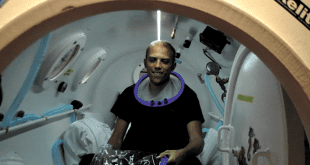Metastatic or stage IV Lung Cancer is one super scary phrase, but Dr. Kamran Darabi who recently joined BayCare Medical Group and St. Anthony’s Hospital has been fighting back against this deadly disease with his patients for the past 15 years. Health and Wellness Magazine had lunch with Dr. Darabi and listened to him talk about Precision Oncology and making sure his patients are getting cutting-edge care.
Dr. Darabi: “15 years ago, after a stage IV lung cancer diagnosis, the average survival was 9-12 months. There was surgery, chemotherapy, radiation, and prayer. That was all I could offer my patients.”
Today, testing the patient’s biopsy specimen at the molecular level can detect more than 300 kinds of cancer DNA changes. We have come as far as being able to get this kind of information with a simple blood draw or “liquid biopsy”. A liquid biopsy can detect cancer cell DNA in the bloodstream to confirm remission from cancer, help in guiding drug therapy or maybe at some point in the near future even screen healthy patients for all kinds of cancer. Statistically, one in two men and one in three women will develop cancer in their life. Currently, screening options for cancer are available for only five types of cancer.
Dr. Darabi: “Today, patients with lung cancer have to undergo CT scans to detect lung cancer on imaging but in the future with a liquid biopsy, cancer DNA could potentially be detected at a much earlier cancer stage in the blood.”
More research is needed to prove that this kind of screening improves patient outcomes.
The liquid biopsy is however already being used in my clinic on a daily basis in the treatment of stage IV lung cancer patients. A lot of patients can now undergo biopsy with a very fine needle to establish a diagnosis in order to minimize their risk of complications from the procedure. However, these fine needle biopsies come with the downside of not getting enough cancer cells to perform extensive DNA analysis. We then turn to a liquid biopsy with a blood draw from the patient and look for cancer DNA changes like for example mutations in the Epidermal Growth Factor Receptor (EGFR) gene. Those EFGR gene mutation changes alter the cell signals. In a way that keeps the cancer cells alive and accelerates cancer cell growth. EGFR mutations are one of many DNA alterations that can drive your cancer’s growth, like an on/off switch.
Dr. Darabi: “Precision therapy drugs act as a “key-in-lock” that turn EGFR off.“
Immunotherapy has been another big gamechanger in lung cancer treatment with about 15% of stage IV lung cancer patients achieving long-term survival after receiving immunotherapy. This has led to a more than doubling of the median survival of these patients to 22 months from the earlier mentioned 9-12 months 15 years ago.
Chemotherapy, radiation, and surgery are not the only treatment options now, thanks to the very successful clinical studies in the past 20 years and we will be always indebted to the patients that participated in those studies and helped move the bar in the treatment of lung cancer.
Dr. Kamran Darabi is board certified in hematology, medical oncology, internal medicine, and transfusion medicine/blood banking. Dr. Darabi earned his Doctor of Medicine from the University of Cologne in Germany, where he also completed a research dissertation at the German Hodgkin Lymphoma Study Group. He then completed a fellowship in transfusion medicine/blood banking at Harvard University and a hematology/medical oncology fellowship at New York Medical College.
He treats patients with a variety of solid and liquid tumors and benign blood conditions. Dr. Darabi has authored and co-authored numerous peer-reviewed medical articles in prestigious journals. He was a co-recipient of the American Society of Clinical Oncology Clinical Trials’ Participation Award in 2010. Dr. Darabi is affiliated with St. Anthony’s Hospital.
BayCare Medical Group Hematology and Oncology
620 10th Street N., Suite 2E
St. Petersburg, FL 33705
To scheduled an appointment please call: (727) 824-8206
 Central Florida Health and Wellness Magazine Health and Wellness Articles of the Villages
Central Florida Health and Wellness Magazine Health and Wellness Articles of the Villages

